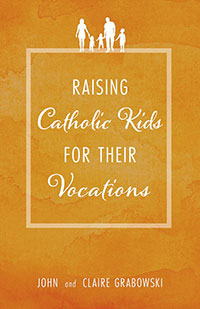‘Raising Catholic Kids for their Vocations’ by John and Claire Grabowski
Raising kids these days is no small feat. As any parent knows, raising children is beautiful, exhausting, and often bewildering.
As any parent knows, raising children is beautiful, exhausting, and often bewildering.
How are they doing in school? Do they get good grades? Are they eating the right foods? Are their friends a good influ-ence? And the list goes on.
These concerns are real, but there are also more spiritual concerns that can get lost in the mix of what the world sees as important. What about raising your child for their vocation?
As parents, it’s our job to get our children to heaven, and helping them discern the vocation God is calling them to is one of the most important parts of that job.
In this practical guide, John and Claire Grabowski offer real advice on how to form your children in the faith. This is not high philosophy or deep theology (though it’s rooted firmly in Church teaching) but real advice, from real parents who have raised five children.
At www.tanbooks.com: Order your copy of “Raising Catholic Kids for their Vocations.” Catholic News Herald readers enjoy 20 percent off their order – use the exclusive coupon code “CNH20.”
‘Wisdom from the women we love’
 HUNTERSVILLE — A sleepless night and a visit from the Holy Spirit were the inspirations for Elza Spaedy’s new book “Wisdom From The Women We Love: Life Lessons Filled With Women’s Wisdom.”
HUNTERSVILLE — A sleepless night and a visit from the Holy Spirit were the inspirations for Elza Spaedy’s new book “Wisdom From The Women We Love: Life Lessons Filled With Women’s Wisdom.”
The St. Mark parishioner says on that night, “In a matter of about one hour, God filled my soul with the vision for this beautiful book… I let God lead me to the right people to make creating this book possible.”
She shares that when she got the inspiration, she felt the Lord was telling her that this book would serve as a way for women everywhere to know that they are never alone in their struggles.
Spaedy says that her pastor, Father John Putnam, was the first person she got in touch with after getting the inspiration. “And in his wisdom he said very matter-of- fact, ‘Elza, I think you have something here,’” she recalls. “That was all I needed to hear to get the ball rolling. He’s been my biggest support throughout this project,” she adds.
“The book is also supposed to help open women’s eyes to all the beautiful teachings of our Catholic Church in a storytelling format, much like what Jesus did in His days with all His teachings in parables,” she explains.
Spaedy trusted in the promptings of the Holy Spirit and she and 24 women have contributed short stories of faith, hope and love in this 167-page first edition released this spring. Each story has an accompanying Scripture verse, as well as questions to promote reflection for individual readers or book club participants.
“God is truly amazing and this book is a perfect example of that,” she says. “I have had many women stop me after Mass to tell me how much they have enjoyed the book and how very inspiring it has been to them. I also have had many women ask me if I have ever considered doing a Spanish version of the book.”
With the success of the first edition, Spaedy is already working on a second edition.
“I had a feeling from the beginning there would be more editions to this wisdom book. The stories from this second one are shaping up to be just as inspiring as the ones from the first one,” Spaedy says.
“Stories connect us more than anything else and we all have so much to share and learn from each other. I’m still blown away that God chose me for this project,” she says.
— SueAnn Howell, Senior reporter
Get a copy
“Wisdom From The Women We Love” is available online at www.amazon.com. Copies are also available at the St. Mark Parish Catholic Shop in the Monsignor Kerin Center. St. Mark Church is located at 14740 Stumptown Road in Huntersville.

